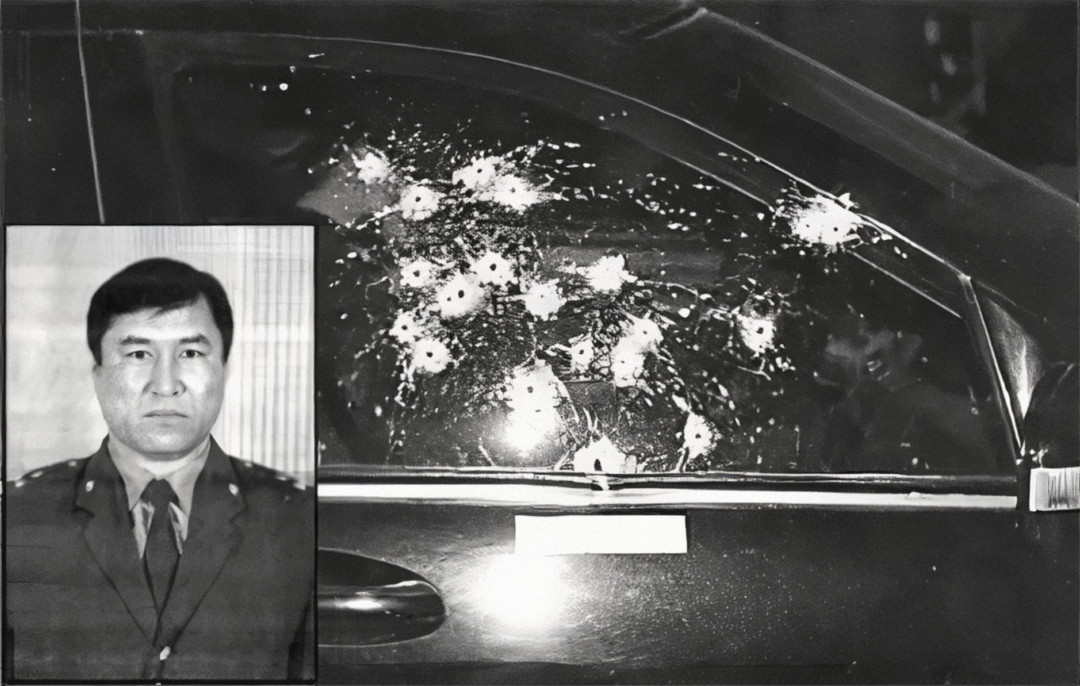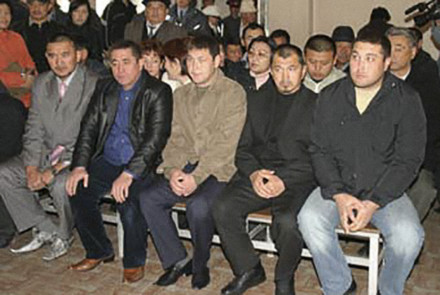5 May 2004
Bishkek, Kyrgyzstan
Chynybek Aliev
Profession
Security
Motive
Governance targeting
Whistleblowing


Adolfo Olivas


Ahmed Divela


Amit Jethwa


Artan Cuku


Babita Deokaran


Bayo Ohu


Berta Cáceres


Bhupendra Veera


Bill Kayong


Boris Nemtsov


Boško Buha


Chai Boonthonglek


Charl Kinnear


Chut Wutty


Chynybek Aliev


Cihan Hayirsevener


Daphne Caruana Galizia


Darío Fernández


Derk Wiersum


Deyda Hydara


Édgar Quintero


Edmore Ndou


Edwin Dagua


Federico Del Prete


Fernando Villavicencio


Gezahegn Gebremeskel


Gilles Cistac


Habibur Mondal


Igor Alexandrov


Jacob Juma


Ján Kuciak


Javier Valdez


Joannah Stutchbury


José Ángel Flores


Jules Koum Koum


Kem Ley


Luis Marroquín


Mahamudo Amurane


Marcelo Rivera


María Elena Ferral Hernández


Marielle Franco


Milan Pantić


Milan Vukelić


Muhammad Khan


Nelson García


Nihal Perera


Oliver Ivanović


Orel Sambrano


Perween Rahman


Peter R. de Vries


Rajendra Singh


Salim Kancil


Sandeep Sharma


Sikhosiphi Radebe


Slaviša Krunić


Soe Moe Tun


Victor Mabunda


Virgil Săhleanu


Wayne Lotter


Yuniol Ramírez


Zezico Guajajara
5 May 2004
Bishkek, Kyrgyzstan
Profession
Security
Motive
Governance targeting
Whistleblowing
On 5 May 2004, Kyrgyzstan celebrated Constitution Day – a national holiday, which, that year, marked 11 years of the independent Kyrgyz Republic. It was also the day that Colonel Chynybek Aliev was assassinated.
Aliev was born in 1961 in the province of Issyk-Kul. He started his police service in 1981 and was later promoted to colonel. In 2005, he was posthumously promoted to the rank of a police major-general and awarded with the Erdik Order (for bravery).
Aliev headed the Kyrgyz anti-corruption department from 2004. Following a direct order from the interior minister to investigate a series of assassinations, he set up the ‘Sixth Unit’ to investigate grave and serious crimes, including exposing organized-criminal groups.
The 1990s had marked a turbulent period, following the collapse of the Soviet Union. Organized-crime networks were becoming increasingly influential, and those who stood in their way risked violence and death.
On this particular day, Aliev’s priority was to join and lead his fellow law-enforcement officers to ensure public safety and order during the national festivities.
The previous day, Aliev had told his pregnant wife, Dilyara, that he was close to cracking a particularly sensitive operation. He would ordinarily never share classified information with his family, but, on this occasion, he seemed unusually anxious. With a sense of imminent urgency and danger, Aliev explained that he planned to show then president Askar Akayev proof that six of the highest-ranking state officials had been colluding with Rysbek Akmatbayev – an alleged organized-crime boss – personally helping him to evade arrest.
Dilyara could not have imagined it would be one of the last things they would speak about. It was clear that the stakes were high in this special operation, but never before in the history of independent Kyrgyzstan had a police officer of her husband’s status been assassinated. Later on, four other high-ranking police officers would similarly fall victim to criminal bosses.
Since the beginning of 2004, there had been seven assassinations of businessmen, criminals and one recently retired police colonel. At the time, Aliev and his department were investigating these crimes. The fact that over 30 assassinations had taken place over the previous two years only increased the pressure.
On 16 April 2004, Aliev detained Rysbek Akmatbayev’s younger brother, Tynychbek Akmatbayev, a politician – who himself was suspected to be a crime boss and killer. During Tynychbek’s detention, Rysbek repeatedly harassed and threatened the colonel by phone.
On 5 May, Aliev received one final call. It was Rysbek Akmatbayev. A few minutes later, the colonel stopped his car at a traffic light. Several dozen bullets fired from an AK-47 rifle perforated the vehicle, 17 of them piercing his body and causing immediate death. Aliev’s colleagues who were with him were unharmed.
A few days before his death, Aliev had warned his brothers to avoid visiting their home province. His older brother, Askerbek, shared these details in an interview with a newspaper in 2008. It is telling that no major Kyrgyz paper or media house approached the Alievs for interviews at the time of the murder. Askerbek’s house, meanwhile, was burgled – but nothing was taken.
The police arrested the bodyguard of Almazbek Atambayev, who would later become the Kyrgyz president. Atambayev at first distanced himself from his bodyguard, but later fiercely defended him and said that they had been together on the day of Aliev’s assassination.
Aliev’s brother, Askerbek, said in a 2009 interview that the investigation of the murder had been incoherent and extremely slow. A lawyer by training, Askerbek studied the 24 volumes of the criminal case. He found conspicuous mismatches and falsified information, which affected the verdict. He concluded that, in the end, his brother had died because of corruption.
Rysbek Akmatbayev and his cronies were also brought to court. Described as a mafia boss and criminal kingpin, Akmatbayev had a criminal record of violent robbery, manslaughter and possession of firearms. He had previously served a term in Russia’s notorious White Swan prison.
When the trial started, however, witnesses and victims refrained from attending the hearing – apparently as a result of extreme pressure and intimidation. Moreover, Akmatbayev and his core team somehow escaped detention, even though he’d been wanted on multiple murder charges since 2001. Before the trial could kick off, two witnesses were killed. One of them was a former police officer who had worked in Aliev’s department. The officer had been dismissed for leaking sensitive information to Rysbek Akmatbayev.
Only one of the four main television channels reported on the trial. The lawyer representing Aliev’s family refused to support the charges. Even the prosecution refused to back their charges against the defendants. This led to all the defendants being acquitted in January 2006.

Aliev and the vehicle in which he was shot dead

A scene during a hearing of Rysbek Akmatbayev, alleged organized-crime kingpin
In the court, Akmatbayev approached Aliev’s family, telling them that the then minister of interior had an interest in Aliev’s murder. The colonel had been in possession of materials compromising six high-ranking officials. Their names remain a mystery.
Akmatbayev went on to successfully lead an electoral campaign for a seat in the national parliament, a seat previously held by his younger brother, Tynychbek, who had been killed by a rival gang. Rysbek would later also die in a drive-by shooting.
In 2009, the only defendant in the case remained the bodyguard, Erkin Mambetaliev. He was found guilty of three out of eight charges, including assisting in the murder of Colonel Aliev, and sentenced to life imprisonment. However, after the revolution of April 2010, Almazbek Atambayev returned to power. His former bodyguard was tried again, amnestied and released from prison. Mambetaliev became one of president Atambayev’s most trusted aides.
In a 2008 interview, Askerbek Aliev said that his brother had been doomed to die early and while serving in office. He recalled that his brother had dreamed of owning a plot of land and some livestock. ‘[He would say], “This is true happiness: to graze cattle surrounded by nature. I envy farmers.”’


20 July 2010
Gandhinagar, India
Amit Jethwa


15 October 2016
Mumbai, India
Bhupendra Veera


21 June 2016
Sarawak, Malaysia
Bill Kayong


11 February 2015
Klong Sai Pattana, Thailand
Chai Boonthonglek


26 April 2012
Koh Kong, Cambodia
Chut Wutty


20 August 2000
Dhaka, Bangladesh
Habibur Mondal


10 July 2016
Phnom Penh, Cambodia
Kem Ley


16 October 2018
Haripur, Pakistan
Muhammad Khan


5 July 2013
Deraniyagala, Sri Lanka
Nihal Perera


13 March 2013
Karachi, Pakistan
Perween Rahman


19 June 2018
India
Rajendra Singh


26 September 2015
Selok Awar-Awar, East Java, Indonesia
Salim Kancil


24 March 2018
Bhind, Madhya Pradesh, India
Sandeep Sharma


13 December 2016
Monywa, Myanmar
Soe Moe Tun